Gary Neal Hansen's Blog, page 9
December 29, 2022
A Children’s Sermon on Luke 2:1-20 — Christmas Eve or Christmas Morning
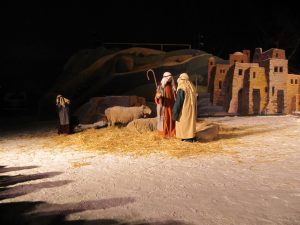
 CC by whistlepunch-NC-SA 2.0
CC by whistlepunch-NC-SA 2.0This children’s sermon on Luke 2:1-20 was going to come out in time for people to use it on Christmas Eve or Christmas morning. Well, it’s a busy season. I worked on it in bits and pieces, but the days slipped past before I had time to give it a polish and send it out.
So I offer this children’s sermon on Luke 2:1-20, dear reader, as a gift in the 12 days of Christmas. It may be a bit long to use in worship anyway. But it will still be there next year. The Lectionary appoints this text for Christmas Eve or Christmas morning every year. And if you have kids or grandkids, you can use it at home any old time.
I’ve shifted the emphasis slightly to feature the children. That’s the baby Jesus of course, but also the shepherds, who were, I suspect, also kids.
So with this children’s sermon on Luke 2:1-20 as my gift, I wish you and those you love a holy, a healthy, and a joyful Christmas.
A Children’s Sermon on Luke 2:1-20Good morning kids! I’m so glad to see you. Thanks for coming up to hear the children’s sermon.
This is one of the most special times in the Church year. Today (actually for twelve whole days) we celebrate Christmas. Christmas is when Jesus was born. God saw that so many people were lost and alone. God wanted to heal our broken hearts, bring us close, and show us how much he loves us. So God decided to be born as a human baby, Jesus, to fix what is broken in us. That’s why we celebrate Christmas.
The Birth of JesusYou probably know the first part of the story. Mary was expecting a baby — God’s baby. She and Joseph had to travel to the town of Bethlehem. They couldn’t find a room to stay in, so they had to sleep in a barn with the animals.
A new baby needs a lot of attention. Mary needed to feed the baby Jesus. Then she needed to change his diaper. Then she needed to feed him again.
Finally Jesus looked sleepy, so Mary wrapped up her newborn baby in soft, soft cloths. She laid him down to sleep in the animals’ food trough, on the soft, soft hay.
Then Joseph said “Mary you just lay down and sleep too. We won’t tell anybody the good news tonight. Just rest.”
And she did.
AngelsBut God wanted to tell about Jesus being born right away.
So God called Gabriel and a whole bunch of other angels and said “Go down and tell people the good news! My Son is born! Maybe they’ll want to go see him!”
And so, quick as a flash, the angels were off. Down to earth they went, to tell the good news,
ShepherdsBy this time it was late at night. Out in the fields, not too far from Bethlehem, there were some kids. What were kids doing out in the fields at night? Well, I’ll tell you: they were working. In these days a lot of kids didn’t go to school. They had to do things to help their families.
It was these kids’ job to take care of their family’s sheep, day and night. They led the sheep to grassy fields to eat. They led the sheep to streams and ponds to drink. And they kept the sheep from getting lost or into danger.
Once evening came, they made a little fire to keep warm. Then one of the kids slept — but one kid always had to stay awake to make sure the sheep were okay.
On this particular night, the one keeping watch was a girl named Miriam. She was sitting by the fire. She was watching the sheep. And she was trying to stay awake.
A SurpriseThen suddenly the angel Gabriel was standing right there in front of Miriam. Gabriel was huge! Gabriel was wearing flowing white robes that shone like the sun! Gabriel actually looked like he was on fire.
Miriam’s eyes went wide. Then she said—well, she said exactly what you would have said. She screamed, “AAAGGGHHH!!!”
Well, when Miriam cried out her brother Isaac woke up. They looked up and they saw Gabriel, giant, glowing with holy fire. And what do you suppose Isaac said?
(All together) “AAAGGGHHH!!!”
A MessageBut Gabriel said “Don’t be afraid, kids! I have good news for you: God’s own son was born tonight.”
“Wait —” sad Isaac “What do you mean ‘God’s own son’?”
“God wants to bring everybody back close to his heart,” said Gabriel. “God loves you all so much that he came in person. He’s been born as a regular baby! He’s the messiah everyone has been waiting for!”
“That’s so cool!” said Miriam. “Can we go see him? Where will we find him?”
“Sure! You should definitely go,” said Gabriel. “He’s in Bethlehem in a barn.”
“Wait —” said Isaac. “God’s kid is in a barn? That can’t be right.”
“Yep,” said Gabriel. “They couldn’t find a room to rent. His mom put him down to sleep in the hay in a food trough.”
“Thanks for coming to tell us!” said Miriam. “What was it like when you told the king?”
“I haven’t told the king,” said Gabriel.
“Oh, right,” said Isaac. “You probably went first to the High Priest. It’s a religious thing.”
“Nope,” said Gabriel. “I didn’t go to the High Priest, either.”
“You must have gone to our parents first, right?” asked Miriam. “They must have told you where to find us.”
“Nope,” said Gabriel. “I haven’t told anybody else. I came to you first in all the world.”
“But we’re just kids,” said Isaac. “Why’d you come all this way to tell us?”
“We wanted you to be the first to know,” Gabriel said.
“Wait —” said Isaac. “You said ‘we’ but there’s just one of you.”
A song“Watch this!” said Gabriel, and he snapped his fingers.
Then suddenly there were other angels. Dozens of angels. Hundreds of angels. The kids and their sheep were surrounded by a bazillion giant glowing, flaming angels!
When the kids saw the multitude of angels they said — well you know what they said.
(All together.) “AAAGGGHHH!!!”
But Gabriel said “Don’t be afraid. Listen to this!”
Then the angels all started to sing. I dont know the tune but the words went
Glory to God on the highest!
And peace to all the people!
God really loves you a lot!
And then all the angels disappeared. Just like that
A Visit“Well that was weird,” said Isaac.
“That was amazing!” said Miriam.
“What should we do?” asked Isaac.
“I wanna go see the baby!” said Miriam.
And so they did. They woke up all their sheep, and everybody went together into the little town of Bethlehem.
They went up and down the streets, looking in all the barns and back yards until they found Mary, and Joseph, and the baby Jesus, who was lying in the manger.
“How did you know where to find us?” asked Mary.
“Angels told us,” said Isaac.
“It was amazing!” said Miriam. “Can I hold the baby Jesus?” she begged. “Please?”
“Oh honey,” said Mary, “I just got him to sleep. Maybe you could just come close and look at him.”
So they did that.
And Mary gave them each a hug. Then, back they went to their fields, with all their sheep, talking about the amazing things they’d seen.
But Mary lay awake thinking about these children who had come to visit, and their strange story about the angels.
And she thought about the sheep. So many sheep they had brought along. “How many were there?” She started to count them in her mind. And finally she dozed off.
Wondering. I wonder how the children felt when they heard the message of the angels? I wonder how it felt to be the first people in the world to know the good news that Jesus was born? I wonder how they felt when they saw the tiny baby who they heard was God’s very own? ++++++++++++You are, of course, free to use this children’s sermon, or adapt it as you find most useful. But, if you use it, please do one (or more!) of the following.
You can let me know that you are using it, either in the comments below, or using the contact form above. You can put a little notice in your church bulletin that your children’s sermon is adapted from one published on GaryNealHansen.com.You can support my work over on Patreon. (Just $1 per month brings my children’s sermons straight to your inbox about two minutes after they go live. And every little bit keeps me going…)The post A Children’s Sermon on Luke 2:1-20 — Christmas Eve or Christmas Morning appeared first on Gary Neal Hansen.
December 14, 2022
A Children’s Sermon on Matthew 1:18-25 — Advent 4
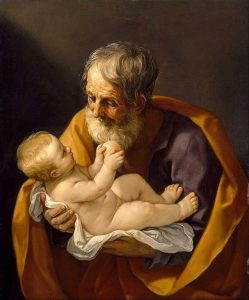
 Guido Reni, Saint Joseph and the Christ Child, public domain
Guido Reni, Saint Joseph and the Christ Child, public domainWriting a children’s sermon on Matthew 1:18-25 is challenging in a different way than usual. The challenge? This text is such a simple, straightforward story that it seems like we should just read it to the kids and ask some wondering questions.
But no. You want a children’s sermon on Matthew 1:18-25, and you shall have it. However, I’ll totally understand if you decide to skip this and just read the text. (You can read my regular Monday Meditation on this text here.)
I’ve fleshed out the narrative in ways that will seem familiar to Orthodox or Catholic readers. We Protestants tend to just live with the Bible’s silence about Mary and Joseph’s family background. Historically, Christians wanted to know more. From very early on there were stories about Mary’s parents and Joseph’s widowhood. (Who knows? Maybe they were handed down from the people themselves?)
A Children’s Sermon on Matthew 1:18-25Good morning, kids! I’m so glad to see you. Thanks for coming up to hear the children’s sermon.
Today is the fourth Sunday of Advent. Advent means “coming.” You know who is coming, right? On Christmas Day we celebrate that Jesus has come to be with us, to give us new life. The coming of Jesus is so important, so amazing, that we need four whole weeks just to get ready.
Joseph and MaryThis week our story from the Bible starts when Jesus’ mother, Mary, was waiting for Jesus to be born. The angel had told her she would have God’s own baby — but she was not married. Raising a baby alone would be very hard. But God had a plan to help.
There was a man named Joseph, who lived in the same town as Mary. He worked as a carpenter. And he wanted to get married.
Joseph knew Mary’s parents, Joachim and Anna, and he respected them very much. And he knew Mary from the village. Joseph liked Mary a lot. Like, a lot lot.
So, as people did in that culture, Joseph asked Joachim and Anna if he could marry their daughter.
“That would be wonderful!” said Joachim.
“But you had better ask Mary,” said Anna. “She’s got her own ideas about things, you know.”
So Joseph made an appointment to come and talk to Mary.
A ProposalThe two of them sat in the living room, while Anna was working in the kitchen nearby.
“Hi Mary,” Joseph said.
“Hi Joseph,” Mary said.
And they both sat there for a minute.
“Wow!” said Joseph. “I’m so nervous!”
“It’s okay,” said Mary. “Just take your time.”
“Thanks,” he said. Then he let out a big breath. “Here we go. Mary, I really like you. I mean I like like you. A lot. I’d like to be a family together. Would you marry me?”
“Oh, wow!” said Mary. Her eyes got big, and she sort of looked around. “I don’t know what to say, Joseph. Don’t you think maybe you’re a little — a little old for me?”
“Right. Well, sure,” Joseph said. “Yes, I’m older than you. But men are often older than their wives.”
“And you were married before,” she said. “You have children already.”
“Yes, that’s true,” Joseph said. “My wife died a few years ago. Being a single father is hard. I’m hoping you can be a new mother to little James and the others.”
A Question“Oh, my,” Mary said. “This is a lot to take in. It’s not exactly what I imagined. There’s something I have to know: Will you be faithful?”
“Absolutely, Mary,” he said right away. “When we’re married, I’ll be true to you for the rest of my life.”
“Right, well, that’s good,” said Mary, “but that’s not what I mean. Will you be faithful to God? I think of myself as God’s servant. Do you want to serve God too?”
Joseph was quiet for a moment. “Yes, Mary,” he said. “I love God, and want to live in God’s ways. If you want to call it being God’s servant, that’s a good way to say it.”
Then it was Mary’s turn to be quiet for a moment.
“Okay, Joseph, I accept,” she said. “I would be honored to be your wife. We’ll serve God together.”
Joseph was so excited, he stood up suddenly. “Oh Mary!” he said. “You’ve made me the happiest man in the world!”
She stood up too — a little more slowly.
Joseph wanted to give Mary a big hug, but in their culture men and women didn’t touch each other until they were married.
So they both just stood there, looking at each other, with big silly grins on their faces.
One More Thing“Joseph,” Mary said. “There’s one more thing we need to talk about. Maybe we’d better sit down.”
So they sat back down.
“What is it, Mary?” Joseph asked.
“Well, you see,” she said, “I’m going to have a baby.”
“Oh, well, sure, Mary,” sputtered Joseph, “we’ll have children someday. After we’re married.”
“No, Joseph,” she said, “I’m going to have a baby now.”
Joseph laughed a nervous laugh, and said, “Um, maybe you’d better talk with your mom about these things. I mean, I’ve never even touched you. Babies won’t come till after we’re married, and living together.”
“Actually, Joseph, I know where babies come from,” she said. “This is different. It’s a gift from God. The baby will be here in about five months.”
“Well I —,” said Joseph.
“I don’t —,” he sputtered.
“But how —?” he asked.
“You can’t —!” he exclaimed.
And then, he was just so flustered he bolted out the door.
A VisitorYou can imagine that Joseph had a hard time getting to sleep that night.
He tossed and he turned.
He turned and he tossed.
Finally he slept.
And as he slept, an angel came to him in a dream.
“Joseph,” the angel said, “wake up. Tell me your plans.”
“Well, I can’t marry her if she’s having someone else’s baby,” Joseph said. “But she’s such a dear person. I don’t want to harm her. I don’t want to make her embarrassed. Give me your advice. How can I get out of this engagement quietly?”
The angel said, “Joseph, don’t be afraid to take Mary as your wife. Yes, she’s having a baby. She’s having God’s baby. Your job is to raise him as a son.”
“God’s baby?” Joseph asked. “How can she have God’s baby? That’s impossible!”
“Joseph,” said the Angel. “Nothing is impossible for God.”
And Joseph woke up.
WonderingI wonder how Mary felt when she had to tell Joseph about God’s baby?I wonder how Joseph felt, thinking about becoming the adopted father of God’s child?I wonder if God will ever ask you and me to do something that we never really expected?++++++++++++You are, of course, free to use this children’s sermon, or adapt it as you find most useful. But, if you use it, please do one (or more!) of the following.
You can let me know that you are using it, either in the comments below, or using the contact form above. You can put a little notice in your church bulletin that your children’s sermon is adapted from one published on GaryNealHansen.com.You can support my work over on Patreon. (Just $1 per month brings my children’s sermons straight to your inbox about two minutes after they go live. And every little bit keeps me going…)The post A Children’s Sermon on Matthew 1:18-25 — Advent 4 appeared first on Gary Neal Hansen.
November 30, 2022
A Children’s Sermon on Mathew 3:1-12 — Advent 2
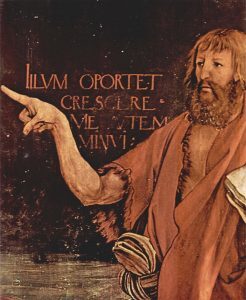
 Matthias Grunewald, John the Baptist from the Isenheim Altarpiece (public domain)
Matthias Grunewald, John the Baptist from the Isenheim Altarpiece (public domain)For the Second Sunday of Advent I bring you a children’s sermon on Matthew 3:1-12. (You can find my regular Monday Meditation on this text through this link.)
The lectionary gospel readings always take us on a backward journey to Bethlehem. I mean, we all know this is about preparing for the celebration of Jesus’ birth. But the Church, through its lectionary, tries to help us keep the much bigger picture in mind.
If we just focused on the baby in the manger, it could all be too sweet, and Christmas might be simply cute. And in the culture surrounding us, Christmas is often just an opportunity for warm cozy feelings. Christians need to remember that it’s all about the coming of God into the world to bring us new and everlasting life.
So on Advent 1 we started from our present moment, looking with expectation to the second coming of Jesus, at the end of the age.
This week, on Advent 2, we take a step back, to John the Baptist waiting for the beginning of Jesus ministry as a grown up. That too is Advent, waiting, for the coming of Jesus.
John the Baptist is the focus here. And, sorry to say, John sounds a little ornery for a children’s sermon. But we hear that orneriness partly because he uses one loaded word: “repent.”
That word is so laden with associations we hardly hear its meaning. It conjures up fiery preachers, in pulpits or on street corners, telling all the listers that they’re guilty of a bunch of stuff and they’d better “repent” — or else. “Turn, or burn” was how we used to caricature it.
Those associations are not necessary to the word itself, though this story does have plenty of brimstone if one wants to focus on it. I’m hoping that my children’s sermon on Matthew 3:1-12 can avoid the orneriness by exploring the actual meaning of the word.
A Children’s Sermon on Matthew 3:1-12Good morning kids! I’m so glad to see you here today in worship. Thanks for coming up for the children’s sermon.
Today is the Second Sunday of Advent. Advent is the four Sundays before Christmas. In Advent, we get ready to celebrate that Jesus was born.
The fact that Jesus came to be with us in the world is so special, so amazing, so wonderful, that we need to take four whole weeks just to be ready for the celebration.
When our story from the gospel starts this week, Jesus was already grown up. But he still hadn’t started doing all the things he did to help people — teaching and healing and helping.
Everyone was still waiting for God to send the Messiah. They didn’t know yet that the Messiah was Jesus.
But one person knew. Jesus’ cousin John the Baptist knew. And John the Baptist was working hard to help people get ready for Jesus to come.
John the BaptistJohn liked to talk to people about getting ready for Jesus. He didn’t just tell people in the Temple, where they were worshipping God already. He went outside and found people who were far away from the Temple. Maybe those people needed to hear the message even more.
When John found a lot of people, he would call out to them.
“Hey! Listen! I want to tell you: The Messiah is coming really soon! Get ready!”
They would ask him, “How should we get ready?”
And John would tell them this: “You need to learn to think in new ways!”
Think in New Ways“We need to think in new ways?” someone asked. “Why do we need to think differently?”
John the Baptist would say, “Because you’ve always thought about life in an earthly kingdom. When the Messiah comes, he’s bringing the kingdom of heaven.”
Thinking about the King“What kinds of things do we need to think differently about?” someone asked.
“First, you need to think about who your king is. You might think some earthly king or ruler is most important — like Caesar, or Pilate, or Herod. But in the kingdom of heaven, the Messiah is king. You need to think in new ways about your rulers.”
Thinking about Ourselves“What else do we need to think differently about?” someone asked.
“You also need to think about yourselves in new ways,” said John.
“About ourselves?” they asked. “What do you mean?”
“Well,” said John, “how do you think of yourselves now?”
“We’re from a very important family!” someone said. “We are the descendants of Abraham and Sarah.”
John said, “That’s no big deal. You need to learn to think in a whole new way!”
“What?” asked someone. “But God loves us because we are Abraham and Sarah’s children! That’s why God is sending the Messiah to us.”
“No,” said John. “Actually God is sending the Messiah to everybody — the whole world. God loves everybody. God loves all kinds of people, from all kinds of families. You need to think in a whole new way.”
Thinking about LeadersThen someone said, “John, we like the stuff you talk about. We’re going to follow you around and do everything you say.”
“That’s not a good idea,” said John. “You need to think about me in a different way too.”
“What?” they asked. “How can following you not be good? You are the most important person we’ve ever met! You’re teaching us how to get ready and live the way God wants us to live. What could be more important than that?”
“Well,” said John, “When the Messiah comes, he’s going to be WAY more important than me. I don’t want you to follow me. I want you to follow him. I’m not even important enough to tie his shoes for him.”
Wondering.I wonder how those people felt when John said they had to learn to think in whole new ways?I wonder whether it’s harder to think new ways about God or about ourselves?I wonder how you and I might need to think in new ways to be really ready for Jesus to come?++++++++++++You are, of course, free to use this children’s sermon, or adapt it as you find most useful. But, if you use it, please do one (or more!) of the following.
You can let me know that you are using it, either in the comments below, or using the contact form above. You can put a little notice in your church bulletin that your children’s sermon is adapted from one published on GaryNealHansen.com.You can support my work over on Patreon. (Just $1 per month brings my children’s sermons straight to your inbox about two minutes after they go live. And every little bit keeps me going…)The post A Children’s Sermon on Mathew 3:1-12 — Advent 2 appeared first on Gary Neal Hansen.
November 23, 2022
A Children’s Sermon on Matthew 24:36-44 — Advent 1
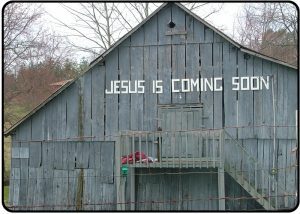
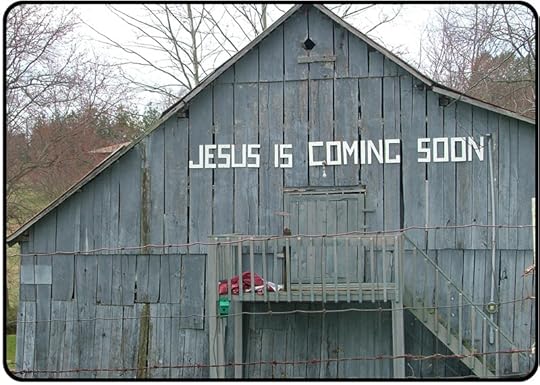 CC by David Campell-NC-SA-2.0
CC by David Campell-NC-SA-2.0Here’s a children’s sermon on Matthew 24:36-44 for the first Sunday in Advent. (If you want to see my regular “Monday Meditation” on the same text, click through here.)
In the Revised Common Lectionary, Advent always seems to start backwards. Advent is four weeks preparing for the coming of Jesus at Christmas. It is also the start of the year for the Church. So how do we kick it off? With Jesus telling us about his second coming at the end of the age.
But taken another way, this chunk of Gospel text actually is starting the Advent journey right where we are. Now, today, we are in the long long season of waiting for Jesus to come again , at the end of the age. We need to get that clear so we can step back in our imaginations to when he came the first time, as a baby in Bethlehem.
So in this children’s sermon or Matthew 24:36-44, my goal is to focus on our present waiting, and what Jesus said about it long ago. I hope that will be helpful in preparing our hearts to receive him in the celebration of his first coming among us.
A Children’s Sermon on Matthew 24:36-44Good morning kids! I’m so glad to see you. Thanks for coming up to hear the children’s sermon. Today is a very special day in the life of the Church. Today we begin a brand new year. Our new year starts with Advent, the four Sundays before Christmas.
Advent isn’t Christmas. Advent is getting ready for Jesus to come. We get ready for Jesus to come to us as a baby. We get ready for Jesus to come to us in his grown-up ministry. And we get ready for Jesus to come back again someday.
Today, on the First Sunday of Advent, we hear a story about being ready when Jesus comes back. Here’s how I imagine it.
Going Away, but Coming BackIt was near the end of Jesus’ life. Jesus had spent three years with his friends. He had taught about the Kingdom of God. He had healed people who were sick. He had fed people who were hungry. And now, he knew he was going to die.
Everybody dies eventually. That’s part of being human. And Jesus knew his death was coming pretty soon. So he started talking about it with his friends.
“You know, guys, when we go to Jerusalem it’s going to be really hard. They are going to arrest me, and hurt me. In fact, I’m going to die.”
“But that’s so sad!” said Mary.
“That’s really scary!” said Thomas.
“No way!” said Peter. “We won’t let anybody hurt you.”
“That’s nice of you, Peter,” said Jesus, “but there’s nothing you can do to stop it. I’m going to die. Then I’ll rise again, and go to be with my Father in heaven.”
“We’re going to miss you so much!” said Martha.
“Thanks, Martha,” Jesus said. “It’s going to be hard, I know. But I want you to know a secret: I’m going to come back.”
Top Secret“What???” they all asked.
“How can you do that?” they asked.
And most of all they asked “When are you coming back?”
“I don’t know, actually,” Jesus said. And he shrugged his shoulders..
“You don’t know?” asked Thomas. “How can you possibly not know? I mean, you’re God and everything.”
“What can I say, Thomas?” asked Jesus. “It’s a super big secret. Nobody knows except my Father. Not me. Not the angels. Nobody.”
“That’s totally crazy,” said Thomas. “I’m not sure I believe you.”
“But that’s how it is,” said Jesus. “I’m allowed to tell you I’m coming back. We want you to have hope instead of being too sad. But I’m not allowed to tell you when. I’m not even allowed to know when myself!”
What to Do?“So what are we supposed to do?” asked James. “Can you give us a hint at least? Like will it be soon?”
“Sorry,” said Jesus, “No hints. Just a plan.”
“What’s the plan?” asked James.
“Be ready,” Jesus said. “Could be any time. Keep your eyes peeled. It’ll be a big surprise.”
“I don’t know,” John said. “I think it would be better if you gave us a list of signs to look out for — so we know when you’re almost here, and make sure everything is ship-shape.”
“Well,” said Jesus, “my advice is to get everything ship-shape right away, and then always be ready. Whether I come back in a couple weeks or a couple thousand years, your job is to get yourself ready, and make sure the world is ready.”
“I have a question,” said Mary. “What does it mean to be ready?”
“Good question,” Jesus said, “Think about all I’ve taught you about the kingdom of heaven. That’s what you need to be ready for.”
Wondering I wonder what the disciples felt like when they found out they couldn’t know when Jesus would come back? I wonder what you and I can do to be ready in our hearts, wherever Jesus comes? I wonder what our church could do to be ready for Jesus to come back?++++++++++++You are, of course, free to use this children’s sermon, or adapt it as you find most useful. But, if you use it, please do one (or more!) of the following.
You can let me know that you are using it, either in the comments below, or using the contact form above. You can put a little notice in your church bulletin that your children’s sermon is adapted from one published on GaryNealHansen.com.You can support my work over on Patreon. (Just $1 per month brings my children’s sermons straight to your inbox about two minutes after they go live. And every little bit keeps me going…)The post A Children’s Sermon on Matthew 24:36-44 — Advent 1 appeared first on Gary Neal Hansen.
November 17, 2022
A Children’s Sermon on Luke 23:33-43 — Christ the King
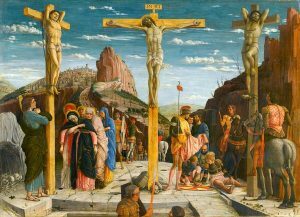
 Mantegna, Andrea – crucifixion – Louvre (public domain)
Mantegna, Andrea – crucifixion – Louvre (public domain)Writing a children’s sermon on Luke 23:33-43 has prompted me to change my whole approach. Usually I try to step inside a gospel story, either retelling a story about Jesus, or retelling a story that Jesus told. I usually try to mine the story for at least a little humor.
This one makes that approach very difficult.
It’s Christ the King Sunday. The lectionary offers us the scene of the crucifixion.
How do I take the crucifixion and make it child friendly? How do I take the crucifixion and relate it to Christ the King?I think it’s time to bring the kids’ attention to the particular day of the Church’s year and then mine the story for connections.
(You can find my regular Monday Meditation on this text here.)
A Children’s Sermon on Luke 23:33-43Good morning kids! I’m so glad to see you this morning. Thanks for coming up to hear the children’s sermon.
Today is a very special day in the Church’s year. This is the very last Sunday of the whole year for the Church. We call this Sunday “Christ the King.”
Next week we start Advent, and we look forward to the coming of Jesus.
This week, we look back on the whole year and see what we’ve learned about Jesus.
What we’ve learned is that Jesus is our king. He talked about the Kingdom of God all the time, and now we know that he is actually the king.
A Surprising StoryThere is something surprising, maybe kind of confusing, about the Gospel story that we read this morning. Out of all the stories in the Bible, on Christ the King we read the story of the day Jesus died.;
It’s a hard story to tell. It’s a hard story to listen to. But I’m going to tell that story to you today, and we’re going to look for what it tells us about what our King Jesus is really like.
Jesus CrucifiedThe story starts after Jesus was arrested, and accused, and mistreated by the Roman governor and his soldiers. The story starts after the governor said that he was going to have his soldiers kill Jesus.
The soldiers took Jesus, along with some criminals, to a hillside outside the city. That’s where the Romans punished criminals.
They stripped off Jesus’ clothes. They nailed his hands and feet to the wooden beams of a cross. And they hung him up, between two criminals, to die.
Bored SoldiersThen the soldiers were kind of bored, so they started to play a gambling game to see who would get to keep Jesus’ clothes.
Jesus looked down from his cross at the soldiers who were killing him, and playing games to steal his clothes. He looked down at those people who were being so mean to him, with his big brown eyes all full of love, and he decided to say a prayer for them.
Jesus called out to God, saying “Father, forgive them please! They don’t have any idea what they are doing!”
That tells me something about our king, Jesus. It tells me something important about how God treats us. When we are mean, and when we do wrong things that hurt God and hurt people, Jesus looks at us with love, too. Jesus prays for us, too. Jesus forgives us, too.
Two CriminalsThere were two criminals who who were hanging on crosses of their own, right beside Jesus. Both of them had broken laws. The Roman law back then said that they should be punished by dying on crosses.
The soldiers had put a sign on Jesus’ cross that said “The King of the Jews.”
One of the criminals started teasing Jesus. He said really mean things, like “Hey Jesus! If you’re a king, why don’t you use your power to safe yourself?”
But the other criminal said “Stop being so mean! We’re both being crucified because we broke the law. Jesus didn’t do anything wrong at all.”
Then this second criminal turned to Jesus and said, “Lord, when you do come into your kingdom, could you please remember me?”
Jesus turned kindly to them man. He tried to smile, even through his pain, and said “Of course! My friend, today you are going to be with me in paradise!”
And that shows me something else important about Jesus. Our king is always ready to forgive us and welcome us home, even if we’ve doe things that are terribly wrong.
WonderingI wonder what stories about Jesus make you think of him as our king?I wonder how you feel about our King Jesus dying on a cross?I wonder if you’ve ever done something mean and asked Jesus to forgive you?++++++++++++You are, of course, free to use this children’s sermon, or adapt it as you find most useful. But, if you use it, please do one (or more!) of the following.
You can let me know that you are using it, either in the comments below, or using the contact form above. You can put a little notice in your church bulletin that your children’s sermon is adapted from one published on GaryNealHansen.com.You can support my work over on Patreon. (Just $1 per month brings my children’s sermons straight to your inbox about two minutes after they go live. And every little bit keeps me going…)The post A Children’s Sermon on Luke 23:33-43 — Christ the King appeared first on Gary Neal Hansen.
November 9, 2022
A Children’s Sermon on Luke 21:5-19

The post A Children’s Sermon on Luke 21:5-19 appeared first on Gary Neal Hansen.
October 20, 2022
A Children’s Sermon on Luke 18:9-14
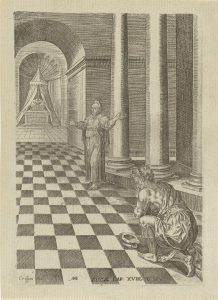
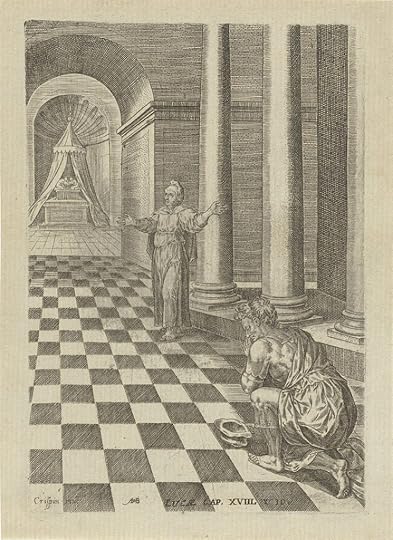 Abraham de Bruyn, public domain
Abraham de Bruyn, public domainWhen I sit down to write a children’s sermon on Luke 18:9-14, I can’t help but make it about prayer. That is, after all, the key action in the story.
The pompous and self-righteous guy prays. Then the lowly penitential guy prays.And it is the next passage right after another great story that Luke and Jesus say is really specifically about prayer: the widow and the judge.
Luke and Jesus give it a somewhat different frame.
Luke says it’s about people who trust in themselves and think contemptuously of others.Jesus ends up by offering a variation on his “first shall be last” message: lift yourself up, and you’ll be cast down. Be humble and find yourself lifted up.But the story itself is so rich in the specific examples of prayer — which do go to Luke’s point and Jesus’ follow up, but which really seem to beg for consideration on their own.
If you want to see my regular Monday Meditation on this, you’ll find it here. And so, without further ado, here’s my children’s sermon on Luke 18:9-14.
A Children’s Sermon on Luke 18:9-14Good morning kids! I’m so glad to see you. It is just great that you are here in worship this morning. Thanks for coming up to hear the children’s sermon.
Last week I told you about a time when Jesus told a story about prayer. Well, right after he finished telling that story about prayer, he told another story about prayer. (I think we’re supposed to get the idea that prayer, talking to God and listening to God, is very important to Jesus!)
That day Jesus was still talking to his friends. Here’s how I imagine it.
Peter spoke up. “Jesus, I pray about stuff all the time. But I’m never sure if I’m doing it right. I’m never sure if I’m asking for the right kinds of things, you know? What kinds of prayers do you think God is most likely to want to answer?”
“That’s a good question, Peter,” Jesus said. “Let me tell you a story…”
Two People Praying, Part 1Once upon a time, there were two people who really wanted to talk with God. Each of them knew exactly what they wanted to talk to God about.
They weren’t friends or anything, but one day they both went up to the holy temple in Jerusalem to pray.
Peter interrupted. “Okay, I see your point, Lord. If you want God to hear your prayer you’re supposed to go to the temple in Jerusalem. That’s the only place you can count on God really hearing you. Right?”
“Actually, no, Peter,” said Jesus. “I haven’t finished my story. But really, you can talk to God anywhere, any time, and God is sure to hear you. God is everywhere, and God loves you. So you can always pray if you want to.”
“Okay,” said Peter. “But then why did they go to the temple?”
“People always have places they especially like to go when they want to pray,” said Jesus. “Some people like to walk in the woods. Some people have a special cozy chair in their home. And some people like to pray where they always gather with their friends to worship God. Now,” said Jesus, “I’m going to go on with my story.”
Two People Praying, Part 2Well, one of the two people who went to the temple to pray was a very important religious leader. He had a special prayer robe he wore to the temple. Everybody at the temple knew who he was.
When he got inside, he looked around and found a place where he could be all by himself. It was up at the front, one step above the main floor. He looked around at all the other people below him. Then he closed his eyes, and lifted up his arms to heaven, and prayed.
He said to God, “O Lord, I am so thankful. And you know what I’m most thankful for? I thank you that I’m not like all these other people here. I mean, look at them, Lord. They are a bunch of liars. Some of them are thieves. Some of them treat their families really badly. They don’t even try to live holy lives — but I do. On two days every week I give up eating food so I can devote myself to you. And when I earn money I give one dollar of every ten to support this beautiful temple. I am so thankful, God, that you made me so special. Thanks, especially, for not making me like that rotten tax collector over there!”
“Oh, I get it,” said Peter, “That guy was praying totally wrong. He was really pompous, and judgy, right? There’s no way God listens when someone prays like that.”
“No Peter,” said Jesus. “God listened to every word that man said. God always hears you when you pray. But do you remember how I said there were two people who went to the temple to pray? I’m going to get back to my story now.”
Two People Who Prayed, Part 3That tax collector, the one the religious leader talked about, was the other person who went up to the temple to pray.
If he had heard that religious leader, he wouldn’t have been surprised by his mean words. The tax collector knew that people didn’t like him. After all, he made people give some of their money to the Roman government. Nobody likes to pay their taxes — and everybody hated people who worked for Rome.
But this tax collector really wanted to talk to God. He looked around and found a quiet corner, off by himself, hoping maybe people wouldn’t see him.
Then he got down on his knees, and bowed his head, and folded his hands — like he was begging before a king.
“Oh God,” he said in his heart, “I don’t dare look up toward heaven where you are. I’m so sorry for the things I’ve done. Nobody here likes me — and I don’t blame them. I’ve done wrong. I’m a sinner. Please have mercy on me!”
And he just kept saying over and over, “Lord, have mercy on me, a sinner!”
“Aha!” said Peter. “That has to be the right way to pray. God totally heard that guy, right?”
“Well, Peter,” Jesus said, “God totally heard both of them. God always listens when you pray.”
“So what’s the difference?” asked Peter.
“The difference is this,” said Jesus. “Only the tax collector went home that day with his sins forgiven.”
WonderingI wonder if you and I ask for mercy if God will answer our prayers too?I wonder if Jesus meant that mercy was the only thing we were really supposed to pray about?I wonder what you would like to talk to God about today?++++++++++++You are, of course, free to use this children’s sermon, or adapt it as you find most useful. But, if you use it, please do one (or more!) of the following.
You can let me know that you are using it, either in the comments below, or using the contact form above. You can put a little notice in your church bulletin that your children’s sermon is adapted from one published on GaryNealHansen.com.You can support my work over on Patreon. (Just $1 per month brings my children’s sermons straight to your inbox about two minutes after they go live. And every little bit keeps me going…)The post A Children’s Sermon on Luke 18:9-14 appeared first on Gary Neal Hansen.
October 12, 2022
A Children’s Sermon on Luke 18:1-8
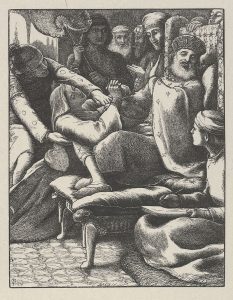
 The Unjust Judge and the Importunate Widow, Dalziel Brothers, after John Everett Millais (Public Domain, via The Met)
The Unjust Judge and the Importunate Widow, Dalziel Brothers, after John Everett Millais (Public Domain, via The Met)There’s hardly a need for an introductory word when I’m preparing a children’s sermon on Luke 18:1-8. Sometimes the lectionary pitches one right over the plate. Or maybe I should say the Gospel does. (Alas, I have no regular “Monday Meditation” to link to on this one.)
Luke 18:1-8 is often called “the parable of the importunate widow” or “the unjust judge.” By Luke’s description it would be more aptly called “a parable about prayer.”
Anyway, I took the last couple weeks away from blogging, as I ramped up for, and then recovered from, some surgery. I seem to have full use of my brain again, thank God, though I’m still waiting for my body to catch up.
So here we go with a children’s sermon on Luke 18:1-8
A Children’s Sermon on Luke 18:1-8Good morning kids! I’m so happy you are here in worship today. And I’m really glad you came up for the children’s sermon.
One day Jesus was talking to his friends.
“You know,” said Mary Magdalene, “sometimes I get really discouraged.”
“Why’s that, Mary?” asked Jesus.
“There are things I’ve been asking God about for a long time. I pray, and I pray, and nothing changes. Sometimes I wonder if God even hears me.”
“Ah,” said Jesus. “That’s hard. I see your point. Let me tell you a story…”
The Widow and the JudgeOnce upon a time there was a very powerful man. He was the most powerful person in his city. He was The Judge.
He had a big fancy chair, up on a platform by the city gate. He sat up there all day in his elegant judge’s robes. People came to him from all around the city to solve their legal problems.
One day, as he sat there, he looked at the line of people waiting to talk to him, and he thought to himself, “My goodness it is nice to have such an important job. All these people, with so many problems, and they all look up to me for help. I must be very special!”
“Excuse me, sir,” came a voice from down by his feet. It was a little old lady. Her hair was all grey. Her back was bent, and she leaned on a cane.
“Excuse me, your honor, but my neighbor is causing me trouble. He’s supposed to be renting my field and sharing the harvest with me. But now he says it’s his field, and he won’t give me anything!”
The judge looked at the long line of people waiting and said, “Okay, I’ll look into the problem. Come back next week. No promises.”
The guards came up and made the woman move out of the way.
Later that Morning…Just before lunch time, the judge heard a familiar voice. “Excuse me, sir!”
He looked down. It was the little old lady again.
“Your honor, I really need your help. I’m a widow, and I have no relatives. My neighbor is stealing my property, and he’s not giving me the harvest. Look, I have the contract right here!” and she waved a piece of paper for the judge to see.
“Very well, give me that,” he said. “I’ll take a look. Please come back in a week. No promises.”
After Lunch…But after the judge’s lunch break he heard a tapping — a banging, really. It was that same old widow, and she was smacking his chair with her cane.
“Excuse me, sir!” she said.
“Didn’t I tell you to come back in a week? This is the second time you’ve been here today.”
“No, your honor,” she said.
“What?!?” raged the judge. “You dare contradict me? Don’t you know I’m the most powerful person in this city?”
“Yes, I know, your honor,” she said. “But I’ve actually been here, before you, THREE times today. It’s because you are so powerful that I keep coming. I really need your help, or I’m going to starve.”
“Well,” said the judge, “I see. As I said before, come back next week. I’ll look into it. No promises.”
The guards took the woman away again but, as soon as they weren’t looking, she got back in line.
Later that Afternoon…Before the end of the day, there she was, standing before the judge.
“There she is again!” thought the judge. “This old widow is going to drive me crazy. I have to do something to get her to leave me in peace!”
“Excuse me, sir!” came the voice of the little old lady.
“Ah,” said the judge. “You again. Well I’ve come to a decision: your contract is valid and will be enforced. The guards here will take you home and make sure your neighbor gives you the harvest. And they’ll put up clear property markers so that he can’t claim your land.”
And the widow walked away happy.
A Story about Prayer“What do you think of my story, Mary?” asked Jesus.
“Well, it’s pretty good, Lord,” she said. “I’m glad the widow got some help in the end. But why did you tell me that story?”
“Because,” said Jesus, “I want you to know that you should always pray, and I hope you never get discouraged. After all, that widow got what she needed from the judge, right?”
“Yeah, sure,” said Mary, “but am I supposed to think God is like that rotten old judge? That doesn’t seem right.”
“No, God is kind and generous,” said Jesus. “God actually loves you.”
“So why the story about begging from a stingy and mean judge?” she asked.
Jesus said, “Look: Even a mean, stingy, rotten, selfish judge will give in when someone keeps bugging him. You are praying to the God who loves you. Just imagine how much more willing to help God is than that judge was!”
“So why doesn’t God answer my prayers more quickly?” asked Mary. “If God is so generous and loving, why do I have to beg and beg?”
“That’s a good question,” said Jesus. “What I’ll tell you is this: God always wants to hear from you. You can always talk to God about what you need, no matter how long you’ve been needing it. And sometimes God responds in very surprising ways.”
WonderingI wonder how the old widow in the story felt when she had to keep coming back?I wonder if you have things you’ve been asking God about for a long time?I wonder how it feels to think of God as generous and loving instead of stingy and mean?++++++++++++You are, of course, free to use this children’s sermon, or adapt it as you find most useful. But, if you use it, please do one (or more!) of the following.
You can let me know that you are using it, either in the comments below, or using the contact form above. You can put a little notice in your church bulletin that your children’s sermon is adapted from one published on GaryNealHansen.com.You can support my work over on Patreon. (Just $1 per month brings my children’s sermons straight to your inbox about two minutes after they go live. And every little bit keeps me going…)The post A Children’s Sermon on Luke 18:1-8 appeared first on Gary Neal Hansen.
September 20, 2022
A Children’s Sermon on Luke 16:19-31

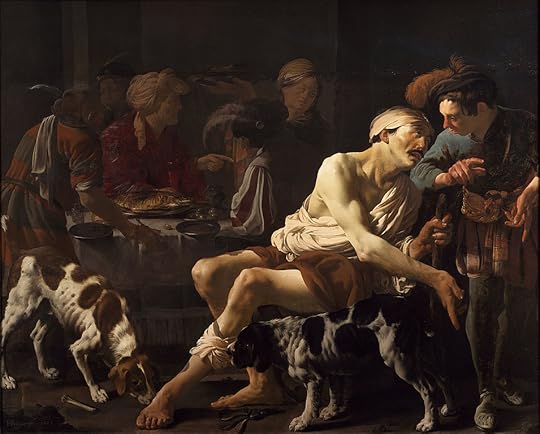 The Rich Man and the Poor Lazarus — Hendrick ter Brugghen (public domain)
The Rich Man and the Poor Lazarus — Hendrick ter Brugghen (public domain)A children’s sermon on Luke 16:19-31, eh? Easy? Hard? Probably on the hard side.
It’s a parable with a good story line, and that removes some challenges. But though it’s a familiar story, it presents some obstacles when it comes to finding and focusing on a kid-sized message.
(I have a longer-than-usual intro here, because I don’t have a regular “Monday Meditation” on this text to refer you to.)
It’s the story of the rich man and Lazarus — sometimes known as “Lazarus and Dives” as if Dives were the man’s name. It actually just means “rich man.”
There are two scenes:
First, on earth, poor sick Lazarus is given no help by the rich guy.Second, after death, the formerly rich guy is suffering in “Hades”, while Lazarus is being comforted by the great patriarch Abraham. They have a chat across the chasm, and Abraham makes it plain that each of the men now has the opposite of what they had on earth.Simple. Also problematic.
The Perspective of the PoorThe story reads best from the perspective of Lazarus. You probably know the old Black spiritual “Rock-a my soul in the bosom of Abraham.’ That image is straight out of this parable. The old translations have Lazarus go to “Abraham’s bosom” and that’s the picture of bliss and comfort after long hard suffering.
Enslaved Black people knew well what it was like to have nothing in this world but oppression and suffering, while other folks nearby had all the wealth and power. It was a natural thing for them to hear this story’s promise to poor old Lazarus as their own hope.
From the perspective of the poor and the suffering it’s actually one of the funnier bits in the Gospels.
Comfort, love, abundance once this brutal life is over — and maybe some schadenfreude. Old Father Abraham shrugs his patriarchal shoulder and says “What can we do? You had yours back on earth. Now we couldn’t help you if we wanted to.” Implication: “Which we don’t. So, whatever.”
An Eschatological Problem?It may not make it into a children’s sermon on Luke 16:19-31, but the text can be problematic for Protestants who want very much to say “Salvation is by grace alone!” Heaven forbid that the next life should depend on something like our wealth or poverty, or perhaps implied, our compassion vs selfishness. Well, I’m just here to tell Jesus’ story. I don’t have to turn him into Paul.
I do think Jesus is joking around with his listeners a bit here. He’s not, I think, trying to say in any literal sense what the afterlife really looks like. After all, instead of sticking with Hebrew understandings of the place of the dead, he borrows the Greek term and concept of “Hades.”
It’s the Greeks, who have Hades, both as a deity and as a place, where death leads to a place of torment. In the Old Testament, references are generally to the emptiness and finality of death. It isn’t a vision of paradise, but neither is it eternal punishment. The New Testament plays the literary changes on this, especially in Revelation where personified Hades makes an appearance, to be conquered by our Lord of life.
It almost makes more sense to read it as Jesus is talking to Greeks, not Jews. Or to imagine him speaking to poor Jews oppressed by rich Greeks. As if he were saying “Each to their own, and on their own terms. Are you a rich Greek? You will die and you know what your stories say: It’s Hades for you. A poor Jew? You know what your stories say too. That’s what you’ll get.”
But what of this is useful for a kid? Let’s see what I can come up with for a children’s sermon on Luke 16:19-31.
A Children’s Sermon on Luke 16:19-31Good morning kids! I’m so glad you are here in worship today. Thanks for coming up to hear the children’s sermon.
In today’s reading from the Gospel, Jesus tells his friends a story. I love to tell you the stories Jesus told. But some of Jesus’ stories are easier to tell to kids, and some are harder. In some ways this is one of the harder stories. But let’s give it a try.
Here’s how the story goes.
Lazarus and the Rich ManOnce upon a time, there were two men. One was very rich.
This man lived in a big fancy house. He wore fancy expensive clothes. And he had a chef working for him, so every meal he had was a big fancy feast, like Thanksgiving dinner.
The other man was very poor, and very sick. His name was Lazarus.
All his friends wanted to help him, but they were poor too.
“I know!” said one of Lazarus’ friends, “We should take Lazarus to that rich guy’s house. Maybe he’ll take care of our friend.”
“Yeah,” said another friend. “Maybe he’ll get a doctor to look at Lazarus’ sores. He’s so miserable.”
“Or maybe,” said Lazarus, “the rich man can give me some of his left-overs to eat.”
So, they carried poor old Lazarus to the rich man’s house and left him on the doorstep.
“Good luck!” said his friends.
Waiting for HelpLazarus lay there all morning. He was hungry. His body hurt because of all his sores. And he was kind of lonely.
As he lay there, a couple dogs walked up. They were really friendly dogs. Lazarus petted them. And the dogs started gently licking Lazarus’ sores to help them get better.
The Rich Man Steps OutAfter lunch the rich man got up from his table. He stretched, and rubbed his tummy, and said “Oh boy, that was a good meal! I think I’ll go for a walk so I have an appetite for the fancy dinner my chef is planning!”
He opened his front door and stepped out onto his porch — and there was Lazarus.
“Who are you?” the rich man asked. “What are you doing on my porch?”
“My name is Lazarus, sir,” he said. “My friends carried me here. They thought maybe you could help me. I’m sick, you see, and I’m very poor —“
“Well!” said the rich man. “I don’t know why they thought I could help. I’m not a doctor. Anyway, you can’t bring your filthy dogs here. Shoo!” he said, trying to drive the dogs away.
“I’m going for a walk,” the rich man said. “I want you gone before I return!”
And off he went.
Every day it went like that. The rich man feasted in his fancy house. Lazarus’ friends laid him on the rich man’s doorstep. When he went out, the rich man just stepped over Lazarus, or walked around him, as if he weren’t there at all.
The Two Men DieThen, as it happened, both men died. Lazarus was swooped up into heaven, and welcomed by Abraham, the first ancestor of God’s people Israel. Abraham rocked Lazarus in his arms, and comforted him, and took care of him.
“Hello!” came a voice from far far away. “Hello! Father Abraham? Can you hear me? I see you up there!”
Abraham and Lazarus looked around. They could see, across a great valley, someone waving his arms and shouting.
“Hey Lazarus!” came his voice from across the valley. “It’s me! Remember me?”
Abraham looked to Lazarus. “Do you recognize him, my son?”
“I think so,” said Lazarus. “Yes, that’s the rich man I used to beg from every day. I used to lay at his doorstep, hoping for help.”
“Did he ever help you?” Abraham asked.
“Not really,” said Lazarus.
Abraham cupped his hands to his mouth and shouted. “What were you hoping I’d do for you?”
“Could you bring me over there where you guys are?” asked the rich man. “It’s really terrible here!”
“Sorry,” said Abraham. “It’s a long way. Why don’t you call an Uber?”
“I don’t have a phone any more,” yelled the rich man. “And I don’t have any money to pay for a ride.”
“That’s too bad,” said Abraham. He shrugged. “I guess there’s no way for you to get here.”
The man pleaded, “Maybe you could just send Lazarus to give me a little water. It’s so hot here. I’m totally miserable!”
“I see that,” said Abraham. “You know, Lazarus used to be miserable too. Did you ever help him?”
They waited, but the formerly rich men didn’t say anything.
The Big Switcheroo?“Maybe this is just how it goes,” said old father Abraham. “You had a lot of really nice things in your life on Earth, and Lazarus had nothing. Now Lazarus has it pretty good for a change. Sorry we can’t come help you!”
“But —! But — ! But —!” cried the formerly rich man. “Do you mean if I’d done something to help that scabby sick beggar on my doorstep I wouldn’t be stuck here alone in misery?”
But then clouds rolled down the valley and they couldn’t see each other any more.
“How about we go for a walk,” said Abraham, “there’s a big feast tonight!”
Wondering I wonder how the poor people felt when they heard Jesus tell that story?I wonder if what we do now really makes a difference after we die? I wonder if there are ways that we can help people who are hungry or sick?++++++++++++You are, of course, free to use this children’s sermon, or adapt it as you find most useful. But, if you use it, please do one (or more!) of the following.
You can let me know that you are using it, either in the comments below, or using the contact form above. You can put a little notice in your church bulletin that your children’s sermon is adapted from one published on GaryNealHansen.com.You can support my work over on Patreon. (Just $1 per month brings my children’s sermons straight to your inbox about two minutes after they go live. And every little bit keeps me going…)The post A Children’s Sermon on Luke 16:19-31 appeared first on Gary Neal Hansen.
September 16, 2022
A Children’s Sermon on Luke 16:1-13

 CC by Daniel X O’Niel 2.0
CC by Daniel X O’Niel 2.0Writing a children’s sermon on Luke 16:1-13 ought to be easy, right? I mean, it’s a parable. Jesus tells a story. I love the parables!
But then I look and see what kind of parable of is. Parables almost always contain some twists once you dig in to them. But this one? My oh my. Jesus tells of a character who loses his job for cheating his boss. Then to cover himself, the guy cheats his boss even more — and the boss praises him!
It seems kind of wacky, to tell you the truth. Why does Jesus set this guy up as an example for us? Of course, I could take the easier, safer road and focus on the explanatory bits at the end. Those lines stand nicely by themselves, without the parable, actually. But no. I want to do something with that story.
Let’s see where a children’s sermon on Luke 16:1-13 actually takes me.
(If you want to see my regular Monday Meditation on his text, alas, there isn’t one. I believe I was in the hospital three years ago when I would have written that.)
A Children’s Sermon on Luke 16:1-13Good morning kids! I’m so glad to see you this morning. It’s great that you are here in worship, and I’m super glad that you came up for the children’s sermon
Jesus and His StoriesYou know, Jesus often told his friends stories. He told all kinds of stories. Sometimes they were short, and sometimes they were long. Some were happy stories, and some were a little bit scary. Sometimes his stories taught lessons that were fun and easy — but other times his stories were actually kind of hard to understand.
Always, though, his stories taught his friends something about the Kingdom of God. Today’s story is one of the ones that’s kind of hard to understand. But let’s give it a try.
It went something like this.
A Guy Who Lost His JobOnce upon a time, there was a man who had a very important job. But one day the man’s boss called him into his office and said, “You can’t work for my company any more. You’re fired. Today is your last day.”
Well the man went back to his own office and sat down to think.
“What am I going to do?” he thought. “How will I take care of my family if I don’t have this job? I’m not strong enough to become a construction worker. Maybe I’ll have to stand on the corner and beg for money! I’d be so ashamed.”
He just sat there for a while, feeling terrible.
But then he got an idea. “Maybe I can do something really nice for my boss’s biggest customers! Then tomorrow one of them will give me a job!”
Right away, he called his boss’s biggest customer.
“Hi!” he said. “I have good news for you. You have been such a great customer that my boss decided you only have to pay half your bill. Congratulations!”
And that’s what he did for all the big customers, one by one, all afternoon. He told each one that they only had to pay part of what they owed his boss.
Then it was time to go home.
“I sure hope my boss doesn’t find out!” he thought.
The Next DayThe next afternoon, just when he was getting ready to go ask one of his old boss’s customers for a job, there was a knock on his door.
*Knock* *Knock* *Knock*
When he opened the door, there was his old boss!
His old boss gave him a great big hug. Then he said “I’m so sorry I fired you! Won’t you please come back and work for me? I’m going to give you a big promotion!”
“Um…” the man said, “Why?”
“All morning long, my biggest customers have been calling! They all say what a great guy you are! Because of you, they want to keep buying my products forever! Firing you was a huge mistake.”
After the StoryJesus’ friends were confused after they heard that story.
“Hey Jesus,” said Peter, “what does that story mean? It sounds like you want us to cheat on our bosses.”
“Well, Peter,” said Jesus, “the boss didn’t feel cheated. He was impressed by how well his worker used what belonged to the business. He was trying to take care of himself, and he also helped other people.”
“But what does that have to do with the Kingdom of God?” Peter asked.
“I wonder,” said Jesus. “In the Kingdom of heaven, who does everything belong to?”
“God, of course,” said Peter.
“So,” asked Jesus, “how do you suppose God feels when you use his stuff to take care of yourself and to help other people?”
“Oh,” said Peter. “Pretty good, I guess.”
“When you do a good job with little things,” Jesus said, “God lets you do bigger things.”
Wondering I wonder how the worker felt when the boss gave him his job back? I wonder what you might do with God’s stuff to take care of yourself and help people? I wonder what God might give you to do after you do a good job with something?++++++++++++You are, of course, free to use this children’s sermon, or adapt it as you find most useful. But, if you use it, please do one (or more!) of the following.
You can let me know that you are using it, either in the comments below, or using the contact form above. You can put a little notice in your church bulletin that your children’s sermon is adapted from one published on GaryNealHansen.com.You can support my work over on Patreon. (Just $1 per month brings my children’s sermons straight to your inbox about two minutes after they go live. And every little bit keeps me going…)The post A Children’s Sermon on Luke 16:1-13 appeared first on Gary Neal Hansen.



